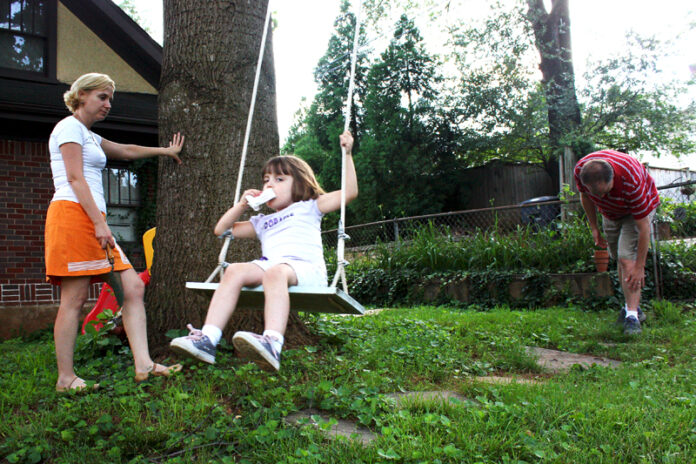
One Roanoke family has reason to wonder if they live in southwest Virginia—or Southeast Asia.
No, they aren’t geographically challenged. But they are overrun with winged pests more common to Vietnam and the Philippines than Rosalind Ave., the street Jeremy Holmes, wife Maria St. Clair and daughter Penelope Holmes call home.
“We have a nasty seasonal mosquito problem,” said Jeremy Holmes. “Once it gets warm, we almost can’t even go in the backyard.”
He’s talking about the Asian tiger mosquito (Aedes albopictus), an invader from across the Pacific that’s made itself at home in the Roanoke Valley and across the southeastern U.S. since 1991. Far more aggressive than its domestic cousins, the Asian tiger mosquito likes to breed in containers commonly found in urban environments, such as potted plants, old tires or clogged gutters, rather than swamps or marshes.
“The Asian tiger mosquito is found in most parts of Virginia, and we have collected it in abundance in the Roanoke Valley and New River Valley regions,” said Dr. David N. Gaines, state public health entomologist.
According to Robert Parker, southwest regional public information officer with the Virginia Department of Health, there were 17 complaints made about mosquitoes to the health department in Roanoke in 2009, but just three so far in 2010. However, Parker said to “keep in mind most mosquito complaints tend to be later in the summer and early fall when mosquito populations typically are higher.”
The complaints are frightening, because Asian tiger mosquitoes can carry diseases. “Last year there were five human West Nile virus cases and one La Crosse encephalitis case identified in Virginia. None of these occurred in the Roanoke Valley,” said Gaines, and “Asian tiger mosquitoes are capable of transmitting either of these diseases.”
That’s a scary prospect for Holmes, because the mosquitoes have a fondness for his wife and daughter.
“My wife and Penelope are particularly delicious apparently, because when they come out they get swarmed,” said Holmes. “It makes it difficult when it gets warm to enjoy coming into the yard.”
Part of the problem is simply locating the mosquitoes’ breeding grounds. “We don’t have a good idea of the source,” said Holmes, although he and St. Clair suspect nearby rental properties that may not be well-maintained. “All the neighbors seem to have the same problem that we do.”
Holmes added, “We’ve tried all kinds of strategies. We try our best to make sure we don’t have the standard issues: no standing water, gutters cleaned out. We’ve planted lemon grass and verbena and some of these things that are supposed to keep them away, but none of them worked.”
Gaines said finding the source of the breeding mosquitoes can be a challenge in an urban environment, because Asian tiger mosquitoes can breed in small pockets of water and tend to roam.“In urban areas where homes are closer together, they are found even around homes that have no suitable breeding containers,” he said. “That is because they spill over from neighboring properties that have breeding sites.”
He added that shady, suburban neighborhoods like south Roanoke “often have a constant background level of Asian tiger mosquito activity.”
Holmes and St. Clair say their nightmare usually begins in May and lasts through September, although this year, the bloodsuckers appeared in April. Time of day doesn’t seem to matter. “They’re bad all day long. We don’t get any rest from them ever,” said St. Clair.
“We’re okay in the front yard,” said Holmes, who was quickly corrected by St. Clair: “We’re better in the front.”
What about good old-fashioned bug spray?
“I don’t like to use it and put all those chemicals on Penelope,” said St. Clair.
The weather doesn’t offer any respite either. “There may be a brief time after a rain when you can come out for maybe fifteen minutes” before being attacked, said Holmes. And because of their unique breeding habits, Asian tiger mosquitoes are largely immune to dry spells.
“Asian tiger mosquitoes will be prevalent in both dry and wet years because most of the containers they breed in are sheltered from wind and sunlight,” said Gaines. “Accumulations of water in containers that are shaded and sheltered from wind evaporate very slowly.
“For example, in 2002, which was a very dry year, I put a five-gallon bucket full of water under trees in my back yard and left it there from the beginning of June to the end of August,” he said. “Even though Richmond City only had a few rain showers in that period, and daytime temperatures were consistently high, there was still more than half a bucket of water standing after three months.”
Gaines added, “Although the water in my bucket was treated with a larvicide, a similar untreated bucket of water could potentially produce 100 tiger mosquitoes a week during the summer months.”
Despite starring in their own Hitchcock thriller every summer (think “The Birds,” but itchier), Homes and St. Clair have no intention of packing up and leaving for a less buggy location.
“I will cut everything down in this back yard” before moving, St. Clair proclaimed, as much to the clouds of invading mosquitoes, as to this reporter.
By David Perry [email protected]
